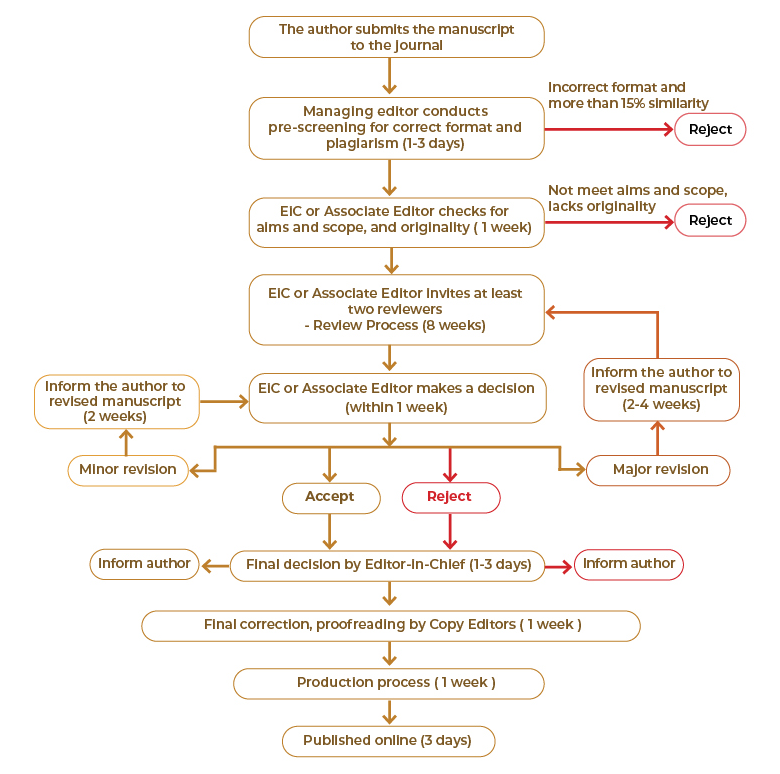Peer Review Process

Peer Review Process Explanation for Authors
1. Manuscript Submission
The author submits the manuscript to the journal.
2. Initial Screening (1–3 days)
The Managing Editor examines the manuscript for proper formatting and checks for plagiarism. If the format is incorrect or the similarity index exceeds 15%, the manuscript will be rejected.
3. Editorial Check (1 week)
The Editor-in-Chief (EIC) or an Associate Editor assesses whether the manuscript aligns with the journal's aims and scope and evaluates its originality. If it fails to meet these criteria, it will be rejected.
4. Peer Review (8 weeks)
If the paper passes the editorial check, it is forwarded to at least two reviewers. They assess the quality, methodology, significance, and contribution of your work.
5. Editorial Decision (within 1 week)
Upon receiving the reviewers’ feedback, the EIC or Associate Editor makes a decision:
Minor Revision → The author will be asked to revise their paper within 2 weeks.
Major Revision: The author will be required to revise their manuscript within 2–4 weeks.
Reject → If the manuscript does not meet the standards.
Accept → If the manuscript meets the standards (sometimes after revision).
6. Final Decision by Editor-in-Chief (1–3 days)
Once revisions are completed and accepted, the EIC provides final approval. You will be formally notified of the acceptance.
7. Proofreading and Production
Copy Editors make the final corrections and proofread the manuscript (1 week). After that, it moves into the production process (1 week).
8. Online Publication (3 days)
The final version of your article is published online.
Publication Ethics and Publication Malpractice Statement for Peer Review Process
JIBS is deeply committed to upholding the utmost standards of publication ethics and preventing any form of publication malpractice within its peer review process. The following set of guidelines guides our dedication to maintaining integrity:
- Confidentiality: Confidentiality is maintained throughout the peer review process, ensuring that all information about submitted manuscripts is treated with the utmost confidentiality. Editors, reviewers, and any other individuals involved in the process are bound by confidentiality obligations and are prohibited from disclosing any details about the manuscript or its review process.
- Objectivity and Impartiality: The peer review process is conducted fairly and impartially. Editors and reviewers assess manuscripts based on their scientific merit, relevance, and overall quality, free from personal biases or conflicts of interest. Their primary objective is to provide constructive feedback to authors, aiming to enhance the quality and rigor of their work.
- Timeliness: JIBS prioritizes timely peer review to ensure the efficient processing of manuscripts. Editors and reviewers are required to conduct their evaluations within a reasonable timeframe. Authors can expect regular updates on the status and progress of their manuscripts, receiving prompt notifications during the review process.
- Transparency and Accountability: The peer review process should embody transparency and accountability. Reviewers are encouraged to offer clear, well-reasoned, and constructive feedback. By leveraging the reviewers' comments and expertise, editors should make fair and informed decisions.
- Conflict of Interest: Editors and reviewers must disclose potential conflicts of interest that could influence their impartiality and objectivity in the review process. Should a conflict of interest arise, necessary measures will be implemented to ensure an unbiased evaluation.
- Plagiarism and Misconduct: Editors and reviewers must be diligent in identifying potential plagiarism, data fabrication, or any other forms of research misconduct. If any suspected misconduct is detected, it should be promptly reported to the appropriate authorities for further investigation and necessary action.
- Peer Reviewer Recognition: JIBS deeply appreciates the invaluable contribution of peer reviewers and acknowledges their expertise and commitment. The journal is committed to properly recognizing and crediting reviewers for their significant contributions to the publication process.
JIBS is dedicated to upholding the integrity and credibility of the peer review process, prioritizing fairness, transparency, and ethical conduct in evaluating manuscripts. By adhering to these principles, we aim to maintain the highest standards of quality and trustworthiness in the research published within our journal.






